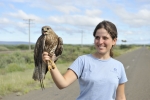|
|

|
| Name |
| C. Lopes, Patrícia |
|
| E-Mail |
| patricy.lopes@gmail.com |
|
| 1st Degree |
| Biology |
|
| University (1st Degree) |
| University of Coimbra |
|
| Master Degree |
| Biology |
|
| About the PhD |
| Field of Research |
| Avian Reproductive Biology, Neuroendocrinology and Behavior |
|
| Thesis Title |
| Social modulation of sickness behavior and its neuroendocrine basis |
|
| Abstract |
| When animals are suffering from an infection, they frequently exhibit symptoms such as reductions in activity, reductions in food and water intake, reductions in libido and in social interactions. Adoption of these “sickness... |
| more |
When animals are suffering from an infection, they frequently exhibit symptoms such as reductions in activity, reductions in food and water intake, reductions in libido and in social interactions. Adoption of these “sickness behaviors” is thought to promote immune function by reducing energy expenditure in activities that are not essential for recovery from the infection and investing this energy in mounting an immune response. In other words, during disease, since the body has limited resources, these need to be traded- off between investment in immunity and investment in other activities. My dissertation work was focused on exploiting this trade-off idea by examining how different social contexts affect the expression of sickness behaviors in birds. Social modulation of sickness behaviors should be especially relevant when animals have an opportunity to reproduce. Hence, my work focused as well on how immune challenges affect the reproductive system and how the social environment can determine the extent to which animals invest in reproduction while sick. Finally, it was my purpose to understand whether alterations in sickness behaviors due to social context impact the immune response in ways that are costly for animals.
The work in this dissertation emphasizes the plasticity of the sickness behavior response. Here, I demonstrate that birds are able to adjust the expression of sickness behaviors when subjected to social circumstances that promote other adaptive opportunities. While the reproductive system is extensively shut down during an immune challenge, I demonstrate that this effect is reversed within 30 minutes of presentation of a potential mate. In addition, my work indicates that the social modulation of sickness behaviors comes at the cost of reduced immune defenses. In a world where infectious diseases represent one of the major causes of death, an increased understanding of the way behavior during infection is impacted by the social environment and the costs this might carry might promote better guidelines on how to proceed with infected animals (including humans). As well, a deeper knowledge of the endocrine and immune factors mediating this response has the potential to lead to better tools to treat infections. On the other hand, the results in here alert for the reality that our ability to detect sick animals might be obscured by social context, reducing our chances of controlling the spread of infectious diseases (such as the avian flu). With the added knowledge from this work, I expect that sickness behavior might be used as a new tool for learning about motivation underlying social behaviors. |
| close |
|
|
| Supervisor(s) |
| George E. Bentley |
|
| Co-Supervisor(s) |
| Eileen A. Lacey, Tyrone B. Hayes and Lance J. Kriegsfeld |
|
| University |
| University of California, Berkeley |
|
| Laboratory |
| Bentley Lab |
|
| City |
| Berkeley |
|
| Country |
| USA |
|
| Date of Thesis Defence |
| 2012-12-14 |
|
| After the PhD (Current Situation) |
| Position |
| Assistant Professor |
|
| Institution |
| Chapman University |
| View Institution website |
|
| City |
| Orange, CA |
|
| Country |
| United States of America |
|
|
| Relevant Publications |
|
| Patrícia C. Lopes, John C. Wingfield, George E. Bentley (2012) Lipopolysaccharide injection induces rapid decrease of hypothalamic GnRH mRNA and peptide, but does not affect GnIH in zebra finches. Hormones and Behavior 62(2):1739. http://dx.doi.org/10.1016/j.yhbeh.2012.06.007 |
| View Publication |
|
Patrícia C. Lopes, James Adelman, John C. Wingfield, George E. Bentley (2012) Social context modulates sickness behavior. Behavioral Ecology and Sociobiology 66(10) pp 1421-1428.
DOI: 10.1007/s00265-012-1397-1 |
| View Publication |
|
Patricia C. Lopes, Hilary Chan, Sophie Demathieu, Paulina Gonzalez-Gomez, John C. Wingfield and George E. Bentley. The impact of exposure to a novel female on symptoms of infection and on the reproductive axis (2013). Neuroimmunomodulation. Accepted.
DOI: 10.1159/000353779 |
|
When is it socially acceptable to feel sick?
Patricia C. Lopes
Proc. R. Soc. B 2014 281 20140218; DOI: 10.1098/rspb.2014.0218. Published 18 June 2014 |
| View Publication |
|
| Patricia C. Lopes, Per Block and Barbara König. Infection-induced behavioural changes reduce connectivity and the potential for disease spread in wild mice contact networks. Scientific Reports 6, Article number: 31790 (2016) |
| View Publication |
|
| Patricia C. Lopes, Why are behavioral and immune traits linked?, In Hormones and Behavior, Volume 88, 2017, Pages 52-59, ISSN 0018-506X, https://doi.org/10.1016/j.yhbeh.2016.09.008. |
| View Publication |
| Publications |
|
| Lopes PC, Sucena É, Santos ME, Magalhăes S 2008 Rapid Experimental Evolution of Pesticide Resistance in C. elegans Entails No Costs and Affects the Mating System. PLoS ONE 3(11) |
| View Publication |
| Last Update |
| 2017-11-22 18:48:06 |
| The responsibility for this page contents is entirely of the student/alumnus. |
|
 |
|
 |
|
 |
|
 |
|
 |
|
 |
|
Program financially supported by
the National Foundation for
Science and Technology
|
|
 |
|



